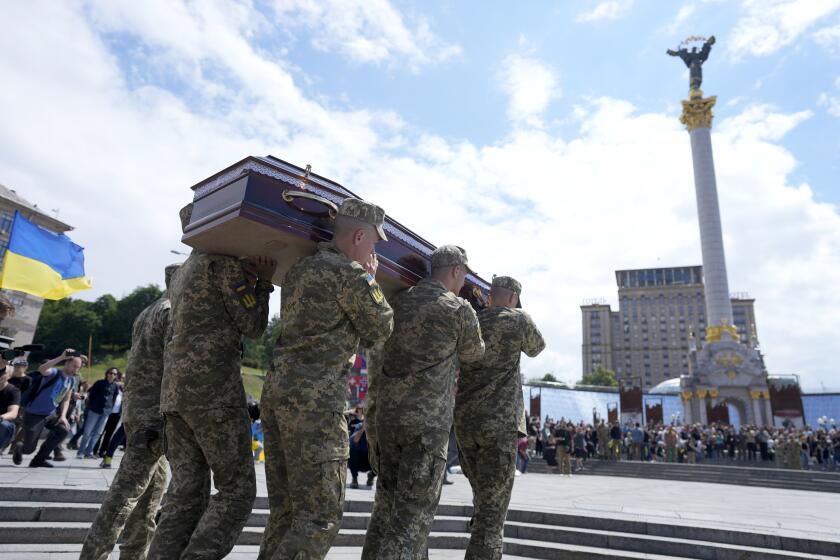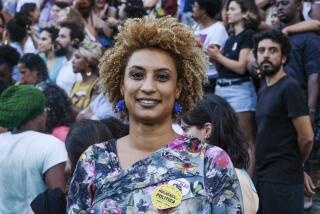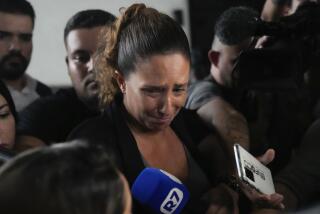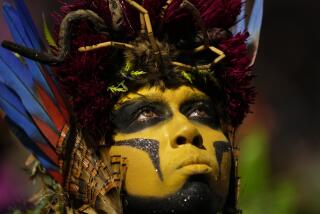‘He gave his life for us’: Fellow activists in Brazil mourn Indigenous expert
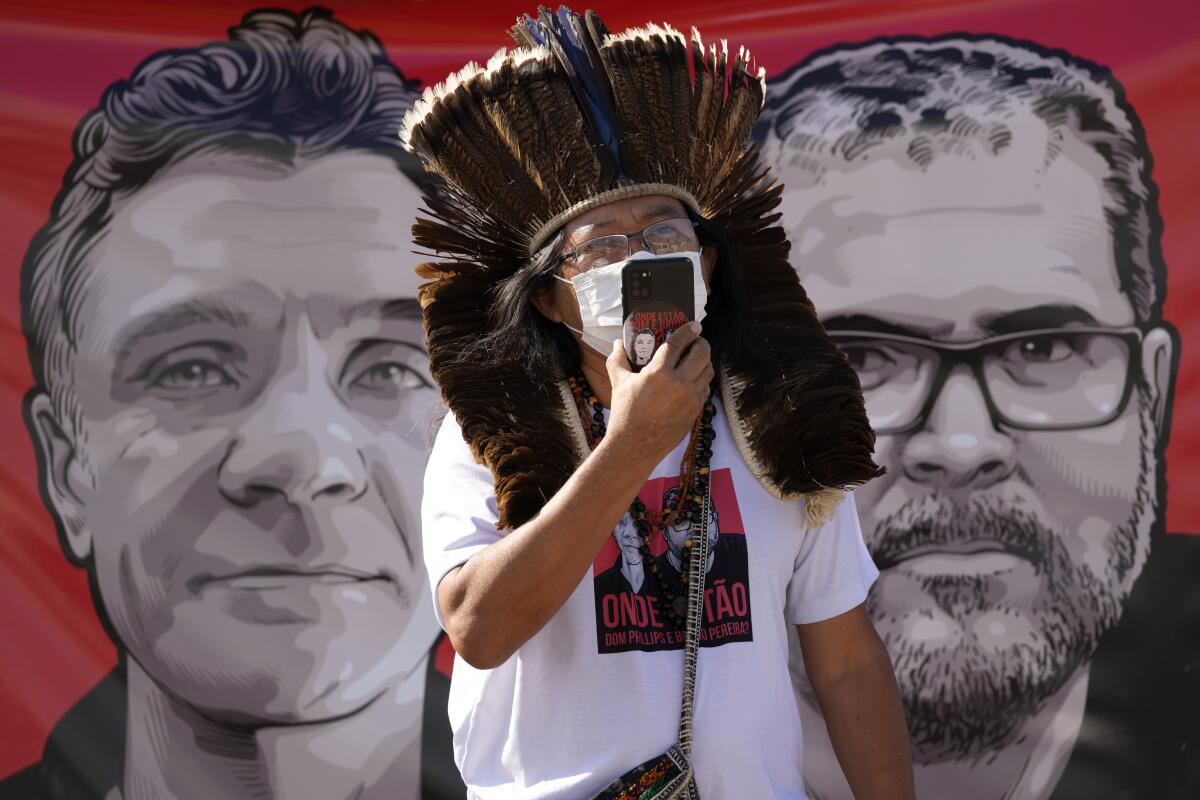
- Share via
SAO PAULO — Before disappearing in Brazil’s Amazon rainforest, Bruno Pereira was laying the groundwork for a mammoth undertaking: the creation of a 215-mile trail marking the southwestern border of the Javari Valley Indigenous Territory, an area the size of Portugal.
The purpose of the trail is to prevent cattle farmers from encroaching on Javari territory — and it was just the latest effort by Pereira to help Indigenous people protect their natural resources and traditional lifestyles.
While Pereira had long pursued these goals as an expert at Brazil’s National Indian Foundation, a government agency known as FUNAI, he worked in recent years as a consultant to the Javari Valley’s
Indigenous organization. That’s because after Jair Bolsonaro became Brazil’s president in 2019, FUNAI began taking a more hands-off approach toward protecting Indigenous lands and people — and the government unapologetically promoted development over environmental protection.
Frustrated, Pereira left the agency and embarked on a more independent — and dangerous — path.
He was last seen alive June 5 on a boat in the Itaquai River, with British freelance journalist Dom Phillips, near an area bordering Peru and Colombia. On Wednesday, a fisherman confessed to killing Pereira, 41, and Phillips, 57, and took police to a site where human remains were recovered. Some of the remains were identified Friday as belonging to Phillips; others are
believed to be from Pereira.
Hundreds gather in Ukraine’s capital to mourn a well-known activist who took up arms against Russia’s invasion and was killed.
Pereira spoke several times with the Associated Press over the last 18 months, including about his decision to leave FUNAI, which he said had become a hindrance to his work. After Bolsonaro came to power, the agency was stacked with loyalists and people who lack experience in Indigenous affairs, he said.
“There’s no use in me being there as long as these policemen and army generals are calling the shots,” he said by phone in November. “I can’t do my work under them.”
As a technical consultant for the Javari Valley’s association of Indigenous people, or UNIVAJA, Pereira helped develop a surveillance program to reduce illegal fishing and hunting in a remote region belonging to 6,300 people from seven ethnic groups, many of whom have had little to no contact with the outside world. He and three other non-Indigenous people trained Indigenous patrols to use drones and other technology to spot illegal activity, photograph it and submit the evidence to authorities.
“When it came to helping the Indigenous peoples, he did everything he could,” said Jader Marubo, former president of UNIVAJA. “He gave his life for us.”
Like Pereira, Ricardo Rao was an Indigenous expert at FUNAI who, in 2019, prepared a dossier detailing illegal logging in Indigenous lands of Maranhao state. But fearful of being outspoken under the new regime, he fled to Norway. “I asked Norway for asylum, because I knew the men I was accusing would have access to my name and would kill me, just like what happened with Bruno,” Rao said.
Bolsonaro has repeatedly advocated tapping the vast riches of Indigenous lands, particularly mineral resources, and integrating Indigenous people into society. He has pledged not to grant further Indigenous land protections and in April said he would defy a Supreme Court decision if necessary.
Before quitting FUNAI, Pereira was removed as head of the agency’s division for isolated and recently contacted tribes. That move came shortly after he commanded an operation that expelled hundreds of illegal gold prospectors from an Indigenous territory in Roraima state.
His position was soon filled by a former evangelical missionary with an anthropology background. The choice generated controversy, because missionary groups have openly tried to contact and convert tribes, whose voluntary isolation is protected by Brazilian law.
Pereira’s colleagues at FUNAI either followed his lead and left or were shuffled to bureaucratic positions far from the demarcation of protected lands, according to a recent report from the think tank Institute of Socioeconomic Studies and the nonprofit Associated Indigenists, which includes current and former FUNAI staffers.
“Of FUNAI’s 39 regional coordination offices, only two are headed by FUNAI staffers,” the report says. “Seventeen military men, three policemen, two federal policemen and six professionals with no prior connection with public administration have been named” under Bolsonaro, it said.
The 173-page report, published Monday, says many of the agency’s experts were fired, unfairly investigated or discredited by leaders while trying to protect Indigenous people.
In response to AP questions about the report’s allegations, FUNAI said in an emailed statement that it operates “with strict obedience to current legislation” and doesn’t persecute its officers.
On the day they went missing, Pereira and Phillips slept at an outpost at the entrance of the main clandestine route into the territory, without passing by the Indigenous agency’s permanent base at its entrance, locals told the AP.
Two Indigenous patrollers told the AP the pair had been transporting mobile phones from the surveillance project with photos of places where illegal fishermen had been.
Authorities have said an illicit fishing network is a focus of the police investigation into the killings.
This is not the first time a person connected with FUNAI has been killed. In 2019, an active FUNAI agent, Maxciel Pereira dos Santos, was fatally shot as he drove his motorcycle through the city of Tabatinga; he had been threatened for his work against illegal fishermen. That case remains unsolved.
Pereira’s killing will not stop the Javari territory’s border demarcation project from moving ahead, said Manoel Chorimpa, a UNIVAJA member. In another sign that Pereira’s work will endure, Indigenous surveillance efforts have begun leading to the investigation, arrest and prosecution of lawbreakers.
Before joining FUNAI, Pereira worked as a journalist. But his passion for Indigenous affairs and languages — he spoke four — led him to switch careers. His wife, anthropologist Beatriz Matos, encouraged him, though it meant long stretches away from their home in Atalaia do Norte. More recently, they were living in Brazil’s capital, Brasilia.
The Indigenous people of the region are mourning Pereira as a partner; an old photo shared on social media shows a group of them gathered behind Pereira as he shows them something on his laptop. A child leans gently on his shoulder.
In a statement Thursday, FUNAI mourned Pereira and praised his work: “The public servant leaves an enormous legacy for the isolated Indigenous people’s protection. He became one of the country’s top specialists in this issue and worked with highest commitment.”
Before the bodies were found, however, FUNAI issued a statement implying that Pereira had violated procedure by overstaying his authorization in Javari territory. This prompted FUNAI’s rank and file to strike, claiming the agency had libeled Pereira and demanding that its president be fired. A court on Thursday ordered FUNAI to retract the statement, saying it is “incompatible with the reality of the facts,” and to cease discrediting Pereira.
Rubens Valente, a journalist who has covered the Amazon for decades, said Pereira’s work became riskier once he felt it necessary to take an independent path.
“Fish thieves saw Bruno as a fragile person, without the status and power that FUNAI gave him in the region where he was FUNAI coordinator for five years,” Valente said. “When the criminals noticed Bruno was weak, he became an even bigger target.”
More to Read
Sign up for Essential California
The most important California stories and recommendations in your inbox every morning.
You may occasionally receive promotional content from the Los Angeles Times.
